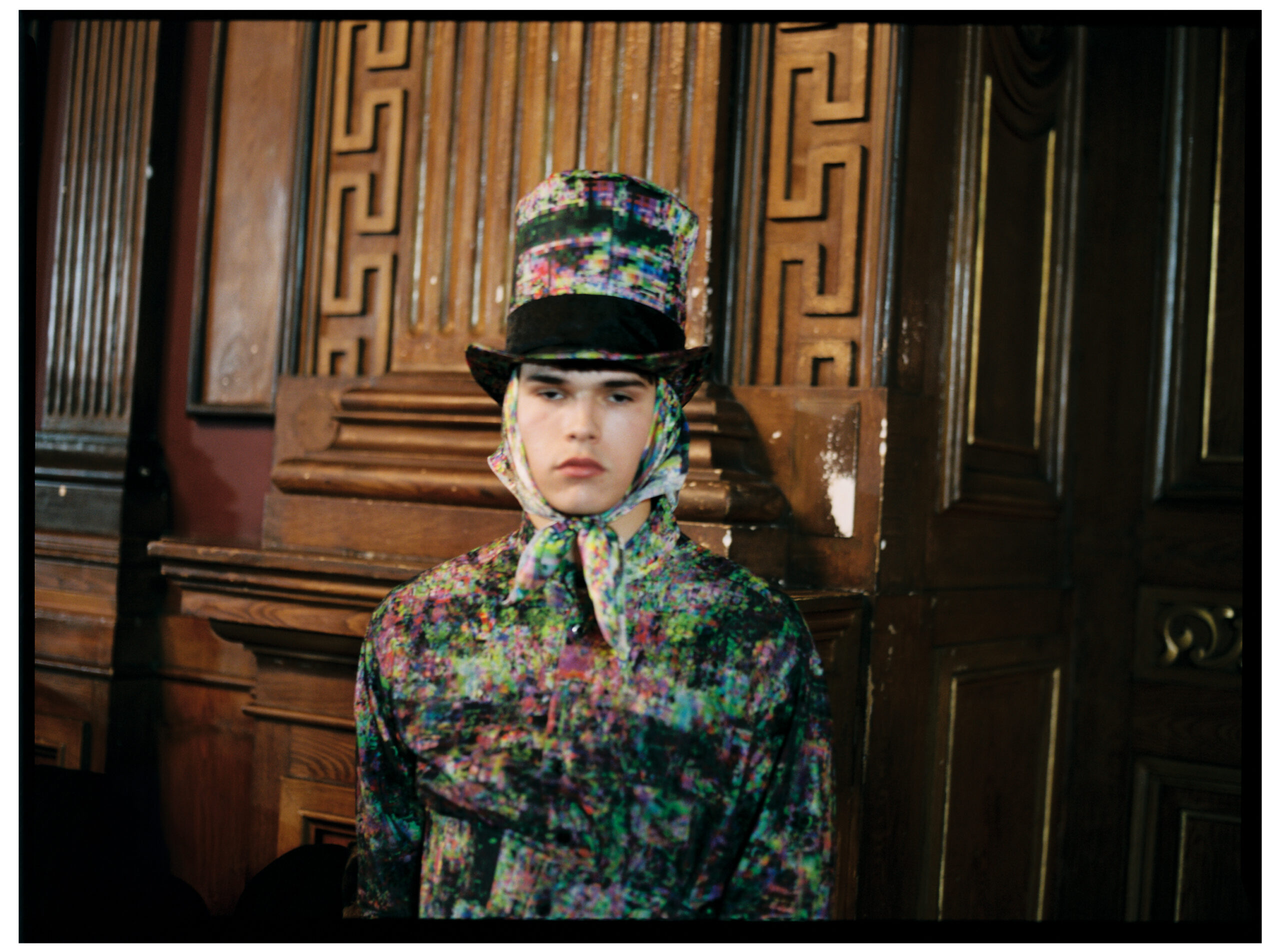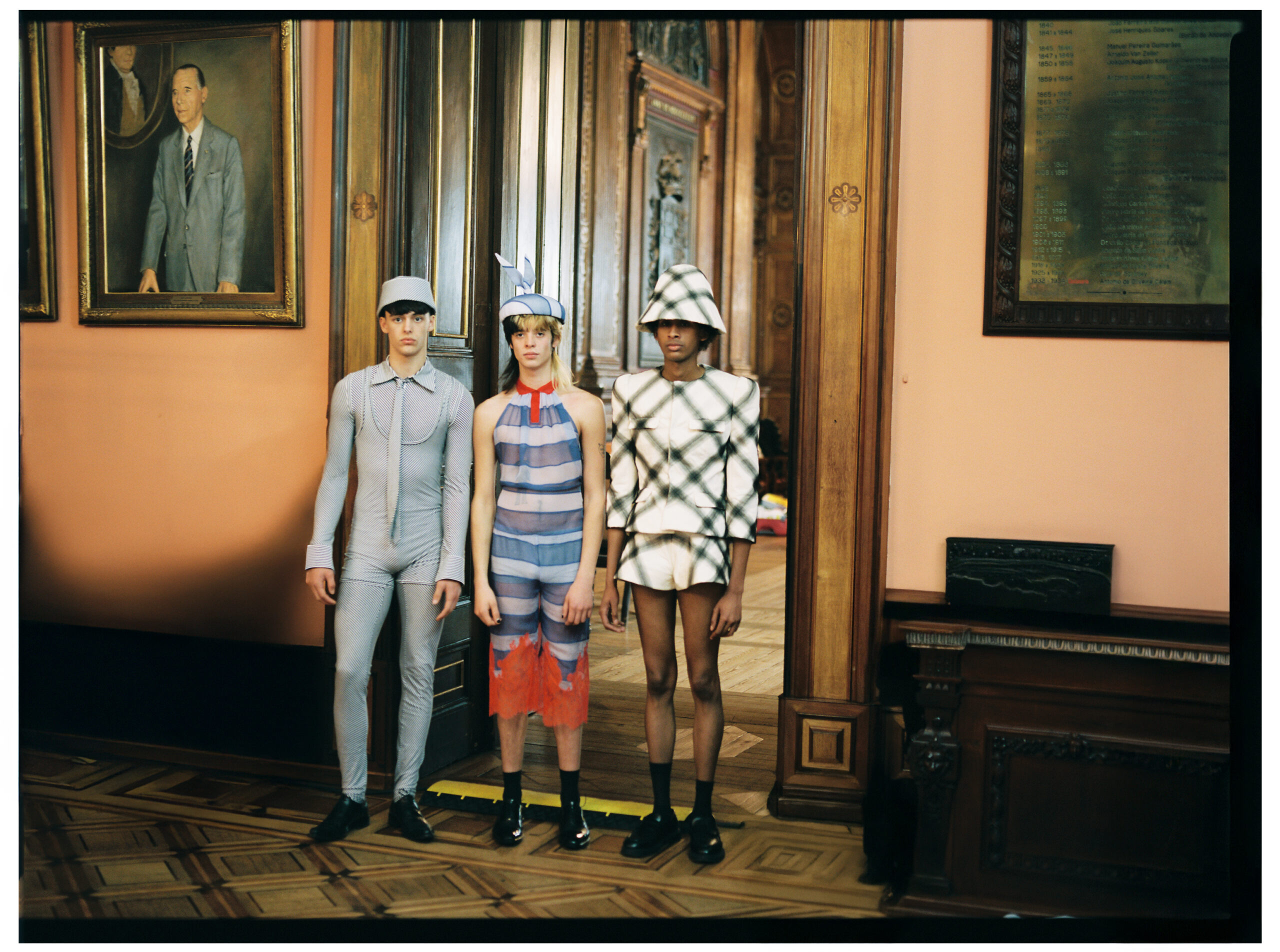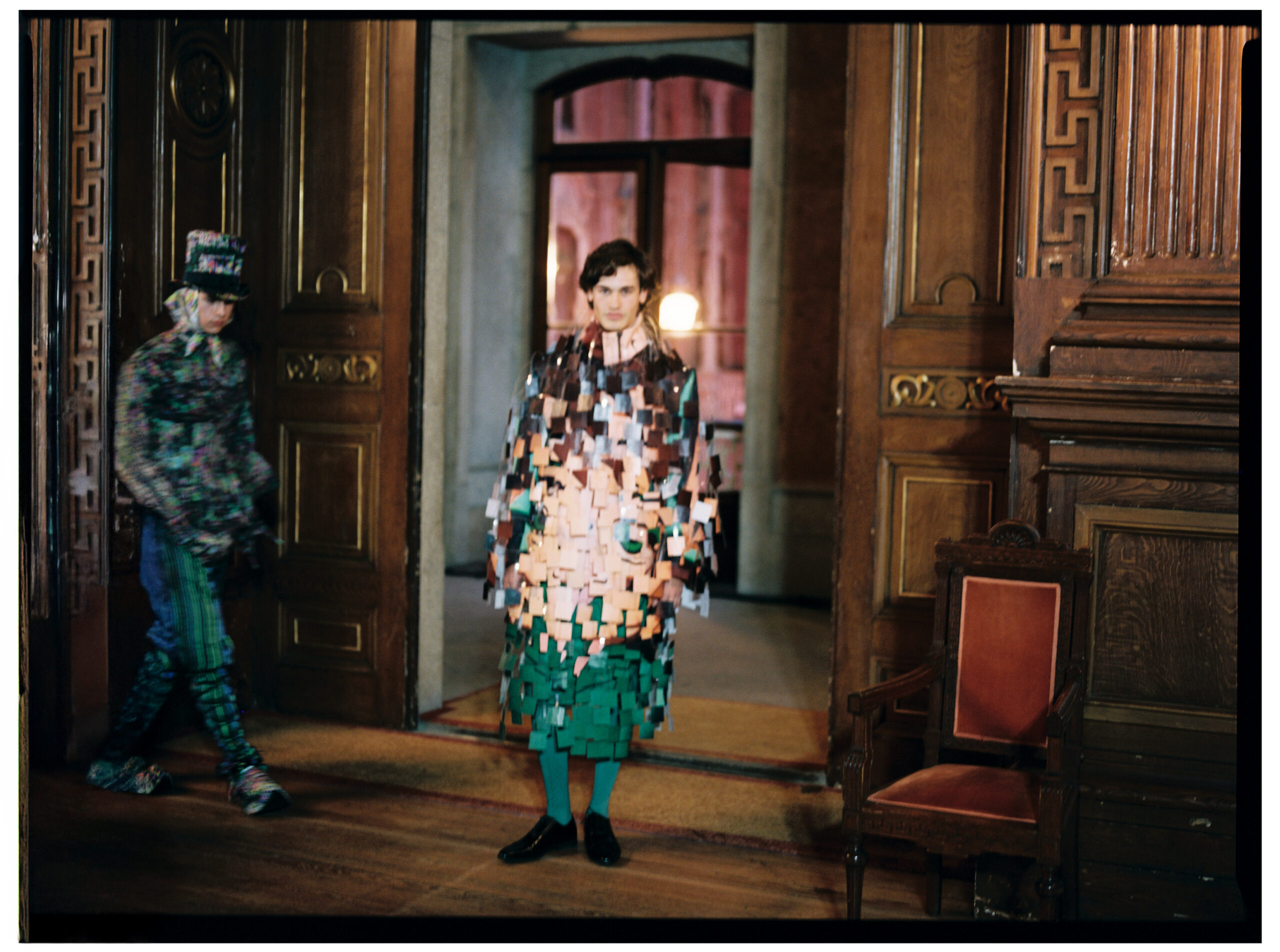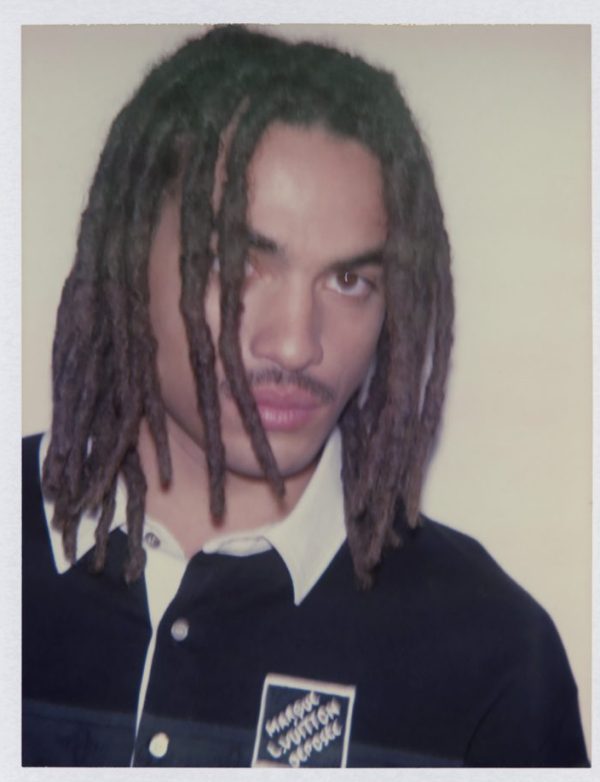
jacket. Christoph Ritter
skirt + neckpiece. Linus Leonardsson
gloves. Andy Froud
opposite
bodysuit + heels. Linus Leonardsson
Writer Caroline Krager, stylist Marko Vrbos and photographer Anna Rosova have joined forces to tell a story of personal space, how it is created and the daydreams born within it. Bedroom Fantasies: Staying hysterically glamorous in the Love house explores these ideas, pairing styles from up-and-coming designers with interviews with the designers themselves. Krager leads this Schön! exclusive Q&A.
Christoph Ritter
26 years old. From Austria. Studied at Central Saint Martins, Royal Academy Antwerp, and Polimoda. Started their brand Christoph Ritter Studio in Autumn 2019. The goal is to produce clothes sustainably and ethically whilst being desirable and aesthetically thrilling. Ritter creates clothes for a future where fashion is being used as a force of good. Their biggest career achievement so far is an event at Sketch during last season’s LFW.
How would you describe your childhood home, and how would you describe your bedroom? What colour was it, what did you do in there, how important was it to you?
As a child, I grew up in multiple homes because of my family’s circumstances. I mainly stayed with my mum but sometimes my dad, grand-aunt, and grandmas as well, so I was used to being passed around to whoever was available. This led to me being less attached to one specific place but rather to the people I lived with. My main bedroom was yellow because I was a fan of The Simpsons. I never spent much time there except when I was sleeping, but I do however remember it as a place where I could create my own world: dance, pose, dress in odd clothes and do weird things that I would never have dared do in the company of others. The beauty of being alone in my room was not having to perform a certain way. Instead, I could say, think, and express myself in whatever way I felt like.
What dreams and fantasies did you have whilst laying on your bed as a child?
I think I tried to figure out what God or entity I needed to pray to that would lead to me moving to London! For me, fantasies had a lot to do with escapism. I dreamt of what the world beyond what I was exposed to was like. My fantasies also correlated strongly with the media I consumed. TV and the Internet made me realise that the somewhat sheltered life I led in Austria was just a tiny fraction of what I wanted my life to be.
How important is home for you as an adult? Has COVID changed your perception of it?
Home is the people who are in your life. Because of COVID and the shift to digital communication, I realised that the physical space I live in is not as relevant as I thought it was. If you know that you have a great network of amazing people around you — wherever in the world they might be — you get less attached to the physicality of your surroundings.
What does your bedroom symbolise for you now? How would you describe it? What fantasies do you have in there?
My bedroom is pretty much anywhere I fall asleep. Sometimes my office, most of the time on an inflatable mattress in my studio. A bedroom is a space in which I can be in the most private of situations, without any outside interference. It’s where I allow myself to explore the absurdities of my mind and where I can dream without judgement. With time I’ve been able to make that space for myself whenever or wherever I’m alone.
Continue this sentence as you wish: “Stay home…”
When you are not protesting!

dress + shoes. Maissane Zinai
headpiece. Leeann Huang x Benny Andallo
jewellery. Chen2g
opposite
jacket. Christoph Ritter
neckpiece. Linus Leonardsson
gloves. Andy Froud
Leeann Huang
25 years old. From Pasadena, California. They just completed their MA in Fashion at Central Saint Martins and started their brand this past month. Their clothes and accessories are colourful and surreal, heavily rooted in craft and innovative materials.
How would you describe your childhood home, and how would you describe your bedroom? What colour was it, what did you do in there, how important was it to you?
My childhood home was a huge playground. The yard was larger than the house, and I spent many weekends helping my dad weeding and planting the garden. There were lots of fruit and flower trees and a massive avocado tree. My room was small and often a storage room for unwanted furniture. I always loved how one of the walls was a large patio door that let in a lot of light and would always wake me up. It was pink with a teacup chandelier my mom found at a yard sale. I would mostly daydream and watch too much television in bed. I really like lying around still.
What dreams and fantasies did you have whilst laying on your bed as a child?
Weirdly, I always dreamt of living on the road. I’d imagine what kind of caravan I’d have and what a palace it’d be. Like the one from Howl’s Moving Castle.
How important is home for you as an adult? Has COVID changed your perception of it?
The longer I’ve lived away from home, the more I’ve wanted to move home. I don’t know if COVID has changed my perceptions of home, but I have been watching way too much Doomsday Preppers and thought about how unprepared everyone is in general for emergencies or disasters.
What does your bedroom symbolise for you now? How would you describe it? What fantasies do you have in there?
It’s a mess. I think it represents how my mind is in general at the moment. It’s sort of hard to figure out what I’m doing right now or what my future is, so I just feel a mess. I mostly daydream of my future dog.
Continue this sentence as you wish: “Stay home…”
And be safe. (Sorry, that’s the only thing that comes to mind!)

top. Christoph Ritter
bodysuit. Maissane Zinai
gloves. Linus Leonardsson
opposite
jacket + trousers. Linus Leonardsson
shoes. Andy Froud
Maïssane Zinai
22 year old. From Paris. They are currently studying at Central Saint Martins with a British Fashion Council scholarship. Their work mainly reflects on the concepts of movements and dynamics through the prism of sustainability and innovation. Their biggest achievement career-wise has been to dress celebrities like Katy Perry and Lafawndah in dramatic and oversized looks. They are also the founder of the light and metal jewellery brand YRGIL which was launched during NYFW in February.
How would you describe your childhood home, and how would you describe your bedroom? What colour was it, what did you do in there, how important was it to you?
I have pretty clear memories of my childhood home and bedroom. My home has always been a refuge for me, and I remember my bedroom as a sort of cocoon with enough objects, tools, and instruments to keep myself fully occupied both day and night. There was a mezzanine with lots of space underneath it for activities and white walls decorated with illustrations from my favourite fantasy books. I was already super-productive at a very young age. I built and crafted, played music and video games, and (I kept this a secret from my family) did a lot of programming and exploring the digital space at night. I had a huge TV — it was much taller than myself at the time — in my room. I modified it to be able to function with my old, thick laptop and watched movies on the big screen. I compulsively bought books and read to escape loneliness. I had a piano near the window and wood pieces, paper, glue, fabric, paint all over the floor. I didn’t understand the concept of a table back then, which is still the case when I’m working from home.
What dreams and fantasies did you have whilst laying on your bed as a child?
The fantasies were all surreal and actually very cinematographic. I created scripts inside my mind inspired by hours of reading greek mythology, plays like Medea and contemporary mythology like Star Wars or heroic fantasy masterpieces such as The Silmarillion or The Lord of the Rings. At around the age of six, I discovered my ability to do lucid dreaming and so I started spending my nights creating more than just dreams, but actual stories inside my mind. It became a way of digesting everything I was passionate about — otherwise, I would’ve probably bothered my mum with hours upon hours of talking!
How important is home for you as an adult? Has COVID changed your perception of it?
It hasn’t changed. It’s the place I don’t feel any pressure or stress. Yes, you might have to co-live with people, but home is for me a place of empowerment. Every day I feel a sense of satisfaction when I’m leaving the CSM studios to continue working at home. The pace of time is different there to out in the ‘real’ world. I also work there a lot during the evenings and nights. COVID initially affected my time management, but I eventually got into the new rhythm. I was afraid my safety-cocoon would end up feeling like a prison during the crisis but it didn’t.
What does your bedroom symbolise for you now? How would you describe it? What fantasies do you have in there?
My bedroom has actually gone back to be the creative place it was when I was younger — with more scraps and papers all around the floor than ever! It’s such a messy place but it houses all the beginning phases of my projects. It’s the place where I have thoughts and develop concepts. When I’m ready to start working on them I continue the process in the living room. That’s perhaps the biggest difference now, that my bedroom is mainly kingdom of the immaterial. And it’s still a place of fantasy where I deal with my obsessions by reinterpreting movies and books inside my mind. In terms of more realistic fantasies, I’d love to build crazy structures with awesome people.
Continue this sentence as you wish: “Stay home…”
It’s the only place where you, yourself, and I can have a full discussion together without being interrupted!

dress. Linus Leonardsson
jewellery. Chen2g
opposite
dress. Leeann Huang
headpiece. Leeann Huang x Benny Andallo
gloves. Andy Froud
Linus Leonardsson
23 years old. Hailing from Stockholm, trained at the Royal Academy of Fine Arts in Antwerp and currently based in London. After graduation, they launched their label during Mercedes-Benz Fashion Week Russia in Moscow in October 2019 after they were invited by the Russian fashion Council to present their graduate collection with a runway show under their Global Talents program. Focusing on societal issues such as gender roles, queerness, and social hierarchies, Leonardsson always makes sure to incorporate glamorous and visually striking elements as well. Collaborations have been at the forefront of the brand’s ethos; they teamed up with Komono on an eyewear collection and with the Woolmark company on knitwear.
How would you describe your childhood home, and how would you describe your bedroom? What colour was it, what did you do in there, how important was it to you?
I had a very safe and sound upbringing in a house in the suburbs outside Stockholm surrounded by greenery and a tight-knit community of neighbours. I have two sisters around the same age as me, so we spent a lot of time playing around the house and in each others’ bedrooms. To me, that’s really what the bedroom came to symbolise at that time — a communal space to share with my closest. It’s funny though, given how it looked: imagine a typical little boy’s bedroom at the beginning of the new millennium, blue walls, full of action figures, building bricks, and LEGO. Thinking back, it’s amazing how I turned out so very fab and anti all of that, haha.
What dreams and fantasies did you have whilst laying on your bed as a child?
Thinking back, it’s pretty crazy how different my childhood was from my current life. I spent a lot of time in the pentecostal church as a child and was fed a lot of stories from that community, which also somehow influenced my reoccurring fantasies about becoming a successful actor and helping the world! I was a very kind and gentle child. But then again, I would also fantasise about Orlando Bloom in Pirates of the Caribbean or dream of becoming an undercover spy or living in a Barbie world, which I guess was an early indicator that all of those religious teachings didn’t really stick anyway…
How important is home for you as an adult? Has COVID changed your perception of it?
My perception of what a home signifies has changed drastically over the last couple of years. Ever since I moved to Antwerp and subsequently London, I’ve moved around quite a lot and the living situations have been extremely varied. However, as fashion and eventually running my own business has taken up a larger portion of my life, the word “home” has become synonymous with my workspace. Sometimes it drives you crazy having nowhere to escape, but most of the time it is great to be surrounded by what you love! Because of this, the home has become synonymous with many things depending on my state of mind. Sometimes it’s my London studio, sometimes it’s my parents’ houses in Sweden, sometimes it’s even Antwerp. I think it depends on what emotional connection you have to a place that makes it feel like home.
What does your bedroom symbolise for you now? How would you describe it? What fantasies do you have in there?
Right now it is full of fabric, glitter, and inspirational images. I’m currently in the middle of developing a new collection, and hence my life is literally surrounded by it. Most of the fantasies revolve around the story I want to tell with the collection, but as a result of spending months locked inside, I’m increasingly daydreaming about the wonders of the world and magical places all over the globe. I’ve got a big window facing west, so often I will sit by my desk and look at the sunsets and travel places in my mind. I think it’s a wonderful thing to do not only for the emotional sensation but also to appreciate where you are at this moment.
Continue this sentence as you wish: “Stay home…”
Stay healthy, stay hysterically glamorous!

dress + shoes. Linus Leonardsson
tights. Leeann Huang
jewellery. Chen2g
opposite
full look. Andy Froud
Andy Froud
24 years. From Oxford. Studied fashion with business at the University of Brighton and graduated last year with a graduate collection called ‘Aesthete’. Their brand focuses heavily on fabrication techniques and traditional menswear silhouettes.
How would you describe your childhood home, and how would you describe your bedroom? What colour was it, what did you do in there, how important was it to you?
I lived in a bungalow on my parents’ farm. The walls were a faded magnolia colour and covered in pictures of Hayley Williams (I was obsessed with Paramore at the time).
What dreams and fantasies did you have whilst laying on your bed as a child?
Being in Paramore.
How important is home for you as an adult? Has COVID changed your perception of it?
I share my home in London with my boyfriend and two close friends — all of us are fashion designers so it’s a really exciting and creative environment to be in.
What does your bedroom symbolise for you now? How would you describe it? What fantasies do you have in there?
Since I work as a designer, most fantasies involve fashion research and development.
Continue this sentence as you wish: “Stay home…”
And listen to lots of Paramore.

jacket. Sarah Olatunde
bodysuit. Linus Leonardsson
opposite
top. Linus Leonardsson
shirt + trousers. Andy Froud

dress. Maissane Zinai
headpiece. Leeann Huang x Benny Andallo
jewellery. Chen2g
opposite
jacket. Sarah Olatunde
trousers, jewellery + shoes. Andy Froud
sunglasses. Linus Leonardsson
Sarah Olatunde
32 years old. Born in Nigeria, but raised in Britain. They have a Master’s degree in Textiles from Central Saint Martins University. They started their brand last year with Nigerian textiles and 80s vintage shell-suiting as their main design influence and design both menswear and womenswear. With their Brixton grit and African eccentricity, they have combined these elements to celebrate two cultures and produce afro eccentric streetwear. Colour and shape are also a major aspect of their work. Their biggest achievement so far is having their garments on Naomi Campbell’s Fashion Relief runway. They also received a fantastic review by Tim Blanks at the CSM Press Show in February 2019.
How would you describe your childhood home and how would you describe your bedroom? What colour was it, what did you do in there, how important was it to you?
I lived in a council flat in the middle of Brixton in Southwest London called the Barrier blocks. It was a ground floor two-bedroom flat with me, my two younger siblings, and my mother. I had to share my bedroom with two of my sisters so it had a bunk bed (single bed on top and a double bed at the bottom). It was a reasonably sized room. The walls were painted a plain magnolia over a wallpaper which I used to peel back in my spare time. I have fond memories of playing with my sisters in our bedroom till the early morning, creating forts using the mattresses, duvets, and pillows. I also remember it being a source of annoyance since I always dreamt of having my own room and space.
What dreams and fantasies did you have whilst laying on your bed as a child?
As a child, I fantasised about having the freedom to hang around my neighbourhood and play with other children outdoors. My parents warned me though about how bad our area was and how it could lead me into bad behaviour. I used to dream of growing up and becoming independent, to be able to make my own decisions, explore, and go on adventures.
How important is home for you as an adult? Has COVID changed your perception of it?
Home is very important for me as an adult. It’s a safe haven for me where I feel loved by my partner and my two children. As a fashion designer, it can be hard to deal with the stress of constantly working, dealing with critics or misconceptions from other people. That amidst the general difficulties of being an up-and-coming designer in the fashion industry. Everything feels a bit easier when you can go home to a family that loves you. COVID has allowed me to spend more bonding time with my family.
What does your bedroom symbolise for you now? How would you describe it? What fantasies do you have in there?
My bedroom consists of a double bed and two cots on each side. It’s a very modern room with white walls and red decor. There are children toys everywhere which constantly reminds me that I don’t live alone.
Continue this sentence as you wish: “Stay home…”
And enjoy the free time whilst you can.

all clothing. Linus Leonardsson
shoes. Leeann Huang x Julian Hakes
opposite
dress. Leeann Huang
gloves + shoes. Andy Froud
headpiece. Leeann Huang x Benny Andallo
This Schön! online exclusive has been produced by
photography. Anna Rosova
fashion. Marko Vrbos
models. Frances Crespin, Joshua Onabowu, Marko Vrbos + Milly Cope
interview. Caroline Krager
designers. Sarah Olatunde, Andy Froud, Linus Leonardsson, Maïssane Zinai, Leeann Huang + Christoph Ritter


Schön! Magazine is now available in print at Amazon,
as ebook download + on any mobile device






































































































